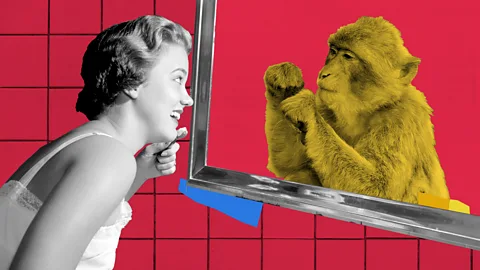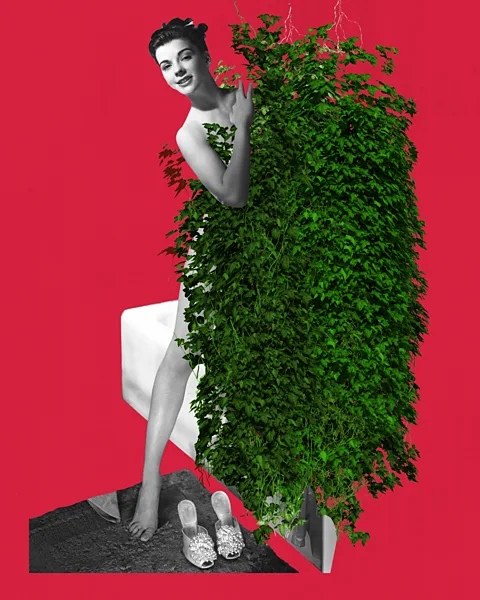Natural doesn't always mean better: How to spot if someone is trying to convince you with an 'appeal to nature'
 Javier Hirschfeld/ Getty Images
Javier Hirschfeld/ Getty ImagesSuggesting that natural products or ingredients are inherently superior to those that are synthetic is a common flaw in reasoning used by influencers, brands and politicians alike.
Before writing this column, I had a hair appointment. As my stylist fastened the smock cape around my neck, she gestured to the shampoo she'd use. "It's a new line, made from 90% natural ingredients," she explained. The accompanying pamphlet, contained short descriptions of each product – one shampoo used prickly pear extract, another acai berries. A third incorporated chia seeds.
When I got home – purchased shampoo bottles in hand – I took a closer look at the ingredient list. Cetearyl alcohol, glycerin, behentrimonium chloride, isopropyl myristate. All common, laboratory-made ingredients. None worried me. But none of which, despite being used in far greater quantities than any of the fruit extracts, were highlighted in the brand's adverts.
The tactic that had been used – perhaps successfully, in my case – is hundreds of years old. It is often deployed on social media, by brands and influencers, and by politicians around the globe.
Often called an "appeal to nature", or the "naturalistic fallacy", it is one of the most commonly-seen types of logical fallacies, or flaws in reasoning that can make a claim sound surprisingly convincing. Anytime you hear someone make a claim that a product or practice is superior because it is "natural", or that one is inferior (or even harmful) because it is not "natural", this is the naturalistic fallacy at work. So are arguments that something is "as nature intended", or that something is bad specifically because it is a "chemical" or "synthetic".
Nature is, in many ways, wonderful. And it has a great deal to teach us. So why isn't it true that something is better merely because it comes from nature?
For one thing, because nature, of course, does not have intentions – not in any conscious sense. As such, nor does it have intentions to be good, or to help humans, specifically.
We don't need to get too philosophical to grasp this. Just consider a handful of nature's creations. Arsenic, which can kill an adult with a dose as little as 70mg, is natural. So is asbestos, which causes cancer. Cyanide, which can kill with as little as 1.5mg per kilogram of body weight if ingested, is a phytotoxin produced, naturally, by more than 2,000 different plant species, including almonds, apricots and peaches. This is also why some "natural" remedies frequently marketed – such as ground apricot seeds – can in fact be dangerous to consume.
And this is the trouble with the use of the word natural that is so commonly used to market products. It is a poorly defined term that doesn't necessarily mean the product labelled as such will be better for you, or indeed safer, than any other alternatives.
One investigation of teething products for babies labelled as "natural" found, for example, that more than 370 infants experienced adverse events such as seizures or delirium. The products were found to contain inconsistent, and at times elevated, levels of belladonna, also known as deadly nightshade.
 Javier Hirschfeld/Getty Images
Javier Hirschfeld/Getty ImagesOf course, there are other natural phenomena we could look at beyond ingredients used in products. Smallpox, for example, once killed one out of every three people it infected. This naturally occurring virus was responsible for killing a jaw-dropping 300-500 million people in the 20th Century alone before it was eradicated thanks to vaccination. Poison ivy and polio, tornadoes and tick bites, the inevitable and eventual death of the Sun that will end all of life on Earth? Natural, natural, natural.
How not to be manipulated
In today's onslaught of overwhelming information (and misinformation), it can be difficult to know who to trust. In this column, Amanda Ruggeri explores smart, thoughtful ways to navigate the noise. Drawing on insights from psychology, social science and media literacy, it offers practical advice, new ideas and evidence-based solutions for how to be a wiser, more discerning critical thinker.
In his 1874 essay On Nature, this was one of the main problems with making "appeals to nature" that philosopher John Stuart Mill pointed out. "Either it is right that we should kill because nature kills; torture because nature tortures; ruin and devastate because nature does the like; or we ought not to consider at all what nature does, but do what it is good to do." In other words: if the premise of the appeal to nature is correct that anything "natural" must be better, because it's natural, then we have to be willing to embrace everything that comes from nature. If we aren't, well, we probably don't really believe something is inherently better because it's natural.
Meanwhile, there are hundreds of things that we might consider not to be natural that, in fact, have made life quite a lot better for many of us. Prior to modern medicine, more than one in 100 women died in childbirth. In wealthy, industrialised countries such as the UK today, it is more like one in 10,000. Before vaccinations were rolled out globally, whooping cough (pertussis) killed one out of every 10 children infected. After the global roll-out, deaths fell to a fraction – 1/157, specifically – of what they had been before.
That's just medicine. Look around you right now, and you'll see a dozen more examples. It's may not be "natural" to wear glasses, refrigerate food, or turn on the heating in winter, for example – but for many of us, it's a better alternative than walking around near-blind, leaving meat to spoil or shivering in the cold.
Much of the food we eat does not come to us as nature presents it. We process and cook it. The harvesting, grinding and processing of grains helped to drive the transition of our species from being nomadic hunter gatherers into settled farmers capable of building sophisticated civilisations. So, too, did the way in which we cultivated and cross-bred crops – meaning that many of the nutritious foods we consider "natural" today, from the orange carrot to the modern banana, look (and taste) far different than their wild forebears.
Of course, it would be wrong to suggest that human-made products don't also cause us problems, whether pollution from synthetic plastics to the use of guns and explosives. Nor does it mean that, in many cases, the more "natural" option is not better for us. But it does mean that we cannot assume the more "natural" option is better just because it's natural – despite a frequent tendency for people to believe the contrary. Carrots might be better for us than crisps, but so too is paracetamol versus arsenic.
Some of these examples hint at one of the other main problems with the "appeal to nature" – how can you delineate what is, and what isn't, natural at all? Humans, after all, come from nature. So, if anything an animal or plant produces is "natural", why isn't anything that humans do? And what of those creations that are blends of what we'd traditionally consider natural and man-made – like vaccinations, which are derived from the parts of a (natural) virus or bacteria, and, when injected, help teach your immune system how to (naturally) fend off that same pathogen in the future?
"Like all truly interesting words, 'nature' is a mille-feuille of meanings," writes the science historian Lorraine Daston. It can mean almost anything, depending on the context. This slipperiness, of course, is exactly what makes it such clever language for marketing – and makes it so easy for us to fall for.
There's another problem, too: even if there were a clear-cut delineation between "humans" and "nature", we're often not very good at knowing what is actually synthetic, versus what is not.
Take brushing our teeth. Is it natural to brush your teeth with a fluoride toothpaste? What about to brush your teeth with a non-fluoride toothpaste?
 Javier Hirschfeld/ Getty Images
Javier Hirschfeld/ Getty ImagesFor many of us, our instinct might be to say that brushing with fluoride is unnatural, while brushing with non-fluoride toothpaste is natural. But fluoride is a naturally occurring mineral that can be found in soil, water and rocks, while one of its common replacements in "natural" toothpastes, nano-hydroxyapatite, is synthetic. And, of course, we'd need to consider that cleaning one's teeth, certainly with the items we use today, is far from natural; the closest primates get to brushing their teeth is "flossing" with whatever is on hand (like bird feathers). Even if we wanted to brush our teeth the way that our human ancestors did, we'd need to scrub our teeth with a twig, pig hairs or even porcupine quills.
Meanwhile, if I told you that I had made a drink for you that was made up of 99% dihydrogen monoxide, would you recoil? This chemical name sounds pretty synthetic, after all, until you think about it.
Dihydrogen monoxide is, of course, two hydrogen atoms and a single oxygen atom. You might be more familiar to see it written in chemical shorthand: H2O. In other words, water.
The next time you see a product being marketed on the basis that it is natural – or see someone arguing against something because it is not – it is worth questioning what is really being meant. And, perhaps, questioning why it is that those behind the product or practice are leaning on the "appeal to nature" fallacy to persuade an audience of its merits – rather than simply laying out the logical argument for just why it is actually the better option.
* Amanda Ruggeri is an award-winning science and features journalist. She posts about expertise, media literacy and more on Instagram at @mandyruggeri.
--
If you liked this story, sign up for The Essential List newsletter – a handpicked selection of features, videos and can't-miss news, delivered to your inbox twice a week.
